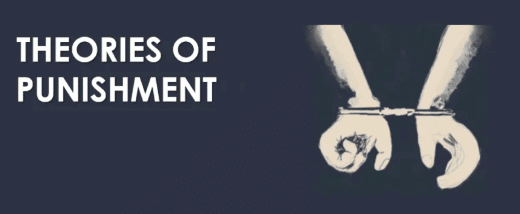Theory of Punishment | UPSC Mains: Ethics, Integrity & Aptitude PDF Download
Theories of Punishment

There are three main theories of punishment:
- Deterrent (or Preventive) theory: This theory holds that punishment is given to teach a lesson, preventing potential criminals from committing the same crime again.
- Retributive theory: According to this theory, punishment is given because it is deserved, and for no other reason.
- Reformative (or Educative) theory: This theory suggests that punishment is intended to reform the criminal.
Each theory has its own guiding principle. The principle of Deterrent theory is to maximize overall happiness in society by reducing crime rates. The principle of Retributive theory is justice, ensuring that punishment is proportional to the crime. The principle of Reformative theory is to make the criminal a morally better individual.
Deterrent or Preventive Theory of Punishment
- The Deterrent theory of punishment is utilitarian in nature because it believes that punishment is not given simply because a crime has been committed, but rather to prevent future crimes. The theory is often expressed by the idea that "You are punished not for stealing sheep, but in order that sheep may not be stolen."
- By making potential criminals aware that crime leads to punishment, the theory aims to control crime rates and create a sense of security within society. The primary principle of this theory is to maximize the happiness of the greatest number of people in society. Jeremy Bentham is a key proponent of this theory.
Retributive Theory of Punishment
- The Retributive theory holds that punishment should be inflicted because it is deserved, and for no other reason. The core principle of this theory is justice, which assumes that if a right act deserves a reward, then a wrong act deserves punishment. Punishment, in this view, is seen as the rightful consequence of the wrong act, treating the wrongdoer as an equal.
- Aristotle and Hegel both support the idea that punishment serves as a negative reward for a criminal. Hegel specifically argues that the violation of moral law demands punishment, meaning that punishment is a natural result of the criminal’s wrongful actions.
Reformative or Educative Theory of Punishment
The Reformative theory of punishment focuses on the idea that punishment should be given with the aim of reforming the criminal. Supporters of this theory argue that crimes are often committed due to ignorance, wrong choices, or underlying mental or physiological issues. They believe that most criminals suffer from conditions such as mental deficiencies or insanity, which lead them to commit crimes. Thus, rather than merely punishing the criminal, this theory advocates for reforming and curing the criminal.
Plato is traditionally considered the father of the Reformative theory, and his stance on punishment can be summarized in three key points:
- The state should relate to the delinquent as a parent does to a child.
- Wickedness or criminal behavior is akin to a mental disease.
- Punishment is a form of moral medicine, which, although unpleasant, is essential for healing and reforming wicked acts.
|
78 videos|139 docs
|
FAQs on Theory of Punishment - UPSC Mains: Ethics, Integrity & Aptitude
| 1. What are the main theories of punishment in criminal justice? |  |
| 2. How does the Retributive Theory of punishment work? |  |
| 3. What is the purpose of Deterrent Theory in the context of punishment? |  |
| 4. How does Reformative Theory differ from other theories of punishment? |  |
| 5. In what ways does Preventive Theory contribute to public safety? |  |





















